Morality

The drone operators sit at consoles on military bases around the U.S. They track their targets and when the moment is right, they send the command to fire. And then people die.
Drones have been in the news a lot over the past month as Congress has considered the nomination of John Brennan to head the Central Intelligence Agency (CIA). Brennan has been the chief architect of the drone policies of the Obama administration.
The constitutional questions have gotten quite a public airing, but drones raise deeper moral questions about what constraints there are on weapons of war.
Yes, drones are efficient, effective, and economical. But what do they do to the soul of this nation, to the psyches of those who push the buttons from half a world away? If they are moral for the U.S. to use at will in any nation of the world, are they moral for other nations to use against us?

Tuesday was the 84th birthday of Rev. Dr. Martin Luther King, Jr. I don’t know about you, but I miss his words, so I offer a few. King said “people often hate each other because they fear each other, they fear each other because they don’t know each other, they don’t know each other because they cannot communicate, they cannot communicate because they are separated.” I would add to his words: ‘and in that separation they seek guns.’ As an evangelical Christian, I’m going to make this theological.
Wayne LaPierre, executive vice president of the National Rifle Association, said this as his response to the massacre of children at Sandy Hook elementary in Newtown, Conn.: “the only thing that stops a bad guy with a gun is a good guy with a gun.”
That statement is at the heart of the problem of gun violence in America today — not just because it is factually flawed, which of course it is, but also because it is morally mistaken, theologically dangerous, and religiously repugnant.

It seems so easy, doesn’t it? Love God. Love your neighbor. The two greatest commandments encapsulate the core of faith and could — if we really were to trust God — transform the world.
Similarly then and with election day looming, voting should be an easy affair: people of faith should vote for the candidates whose policies would most embody a love of God and neighbor.
It seems so easy, but it isn’t if we are honest with ourselves and gracious towards those who disagree with our political persuasions. No single party or candidate has a monopoly on loving God and neighbor. Moreover, people of passionate faith and commitment to the values Jesus commends in Mark 12:28-34 so often can’t even agree on what these seemingly simple commandments mean.
Such disagreements about what it means to love God and neighbor are at the very center of so many of our political debates.
Some Christians will vote for President Obama, arguing that the most loving thing we can do for our neighbor is to build a stronger social net. Some Christians will vote for Mr. Romney, arguing that the most loving thing we can do for our neighbor is let loose the power of the market to create good-paying jobs for all. Some Christians will cast a ballot for Mr. Romney in support of his stance on abortion. Some Christians will cast a ballot for President Obama, noting that the availability and affordability of basic health care is a pro-life position.
All of us, if we are honest, will vote for a flawed candidate.
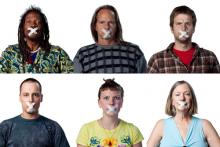
Of all the ugliness in Election 2012, nothing is more disturbing than attempts to prevent people from voting. Voter suppression strikes at the very heart of American democracy.
The flood of money into this year's campaigns has been bad enough, as wealth has sought to do what wealth usually seeks to do: gain control and preference.
The shouting of lies – not just shading the truth, but outright lies – has cheapened the liars and insulted the public.
Demagogic attacks grounded in religion, phony patriotism and race have undermined public trust in all politicians. It will take years to dig out from under the rot of such scorched-earth tactics.
But denying the basic right of citizenship to millions of voters is an offense we should all be protesting. For if the powerful can deny the vote to their opponents – especially the poor and people of color – they can deny the vote to anyone.
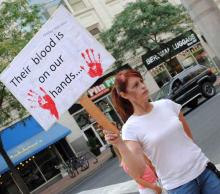
SPOKANE, Wash. -- They stood in front of a shopping mall, shackled together, heads down, nameplates dangling around their necks, bearing the names of men and women who have died on America’s death row.
Cal Brown.
Teresa Lewis.
Cameron Todd Willingham.
Behind them, stood Victoria Ann Thorpe, dark makeup painted on her cheeks and a sign painted to look like blood stains waving above her head: “Their blood is on our hands.”
Somehow, despite Thorpe’s gory exterior, she’s approachable.
“Would you like information on the death penalty?” she asks shoppers as they exit the mall, unable to avert their eyes from the scene in front of them. She hands them a clipboard and one by one, they fill out postcards showing their support to abolish the death penalty in Washington. The cards will later be sent to state lawmakers. The group has also protested at Gonzaga University and so far has collected more than 200 signatures.
Thorpe, along with the Safe and Just Alternatives organization and The Inland Northwest Death Penalty Abolition Group, is seeking to pass a state law to replace the death penalty in Washington state with life without parole.
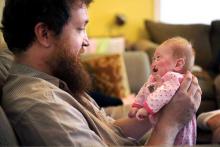
NASHVILLE, Tenn. -- Eric and Ruth Brown believe nothing about daughter Pearl Joy's life is a mistake.
They say God gave Pearl her bright red hair and wide blue eyes, as well as the genetic disorder that created a cleft in her upper lip and caused her brain's development to stall in the first weeks in the womb.
"Things didn't go wrong," Eric Brown said. "God has designed Pearl the way he wanted, for his glory and our good."
That belief has sustained the Browns during the past six months, ever since a routine ultrasound revealed that the couple's third child has alobar holoprosencephaly, a rare genetic condition that's almost always fatal. A specialist told the Browns she would probably die in the womb and advised them to end the pregnancy early.
It's one thing to talk about God's will when life is good. It's another when a doctor is saying your baby won't live.
The Browns were forced to consider religious, medical and ethical issues most parents never will. And nobody could make their decision for them.
The Browns never considered abortion. They believe that Pearl is "fearfully and wonderfully made," as Psalm 139 puts it, and God alone should decide when she lives and when she dies.
Seeing Pearl's beating heart on the ultrasound also persuaded them to continue the pregnancy, even if the odds were stacked against her.
"If there is a chance, you say yes to that chance," Eric Brown said. "The only thing I know about parenting is that you say yes."
So far, Pearl has beaten the odds.
Few babies with Pearl's disorder make it to term, and of those who do, only 3 percent survive birth, according to the Dallas-based Carter Centers for Brain Research in Holoprosencephaly and Related Malformations. Pearl has a particularly severe form of the condition, which means her brain never divided into two hemispheres.
She turned 11 weeks old Oct. 12, a milestone that the Browns celebrated by lighting 11 candles and singing "Happy Birthday."

The recently revealed video of Gov. Mitt Romney at a fundraising event last May is changing the election conversation. I hope it does, but at an even deeper level than the responses so far.
There are certainly politics there, some necessary factual corrections, and some very deep ironies. But underneath it all is a fundamental question of what our spiritual obligations to one another and, for me, what Jesus' ethic of how to treat our neighbors means for the common good.
Many are speaking to the political implications of Romney's comments, his response, and what electoral implications all this might have. As a religious leader of a non-profit faith-based organization, I will leave election talk to others.

My friend, Doug, is not what I’d call a religious person. He grew up in church but has since taken to a combination of practicing martial arts, yoga, and independent study, primarily of Buddhist philosophy. In a lot of ways, his journey is a familiar one for younger adults today (he and I are both 40 so we don’t really qualify as “young” adults anymore).
Doug is, like I am, an intellectually curious guy. He follows my work pretty closely, and he is certainly open to other points of view, even if they’re not ones he embraces for his own life. Sometime we share ideas back and forth, but this quote from the Dalai Lama that he sent me recently really got my attention:
"All the world’s major religions, with their emphasis on love, compassion, patience, tolerance, and forgiveness can and do promote inner values. But the reality of the world today is that grounding ethics in religion is no longer adequate. This is why I am increasingly convinced that the time has come to find a way of thinking about spirituality and ethics beyond religion altogether."
A court in Cologne, Germany, recently ruled that circumcising young boys represents grievous "bodily harm." The court found that the child’s "fundamental right to bodily integrity" was more important than the parents’ rights. According to the court, religious freedom "would not be unduly impaired" because the child could later decide whether to have the circumcision.
In response to the ruling, some Jews and Muslims who practice circumcision for religious reasons have protested vehemently. Subsequently, German politicians pledged to pass a law to protect ritual circumcision of young boys. Israeli Chief Rabbi Yona Metzger even traveled to Berlin to defend Jewish circumcisions, and a complaint against a Bavarian rabbi for performing circumcisions drew the anger of the Anti-Defamation League. The legal and cultural dilemma inherent in the issue makes prompt resolution unlikely.
Most of Germany (and the world) does not circumcise. It is instinctively viewed as harmful. Here's why...
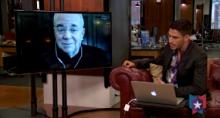
Sojourners' CEO, the Rev. Jim Wallis, was a guest on Arianna Huffington's new online news channel, HuffPo Live, today to talk about the face of poverty in this heated election season and what has changed (or not) since the 2004 presidential election.
"More children than ever are poor," Wallis said. "From a religious point of view, that should be a top election issue. The highest poverty rate in half a century should be a fundamental moral issue."
"More and more of our friends are in poverty," Wallis told HuffPo Live host Ahmed Shihab-Eldin, "in the pews, in our workplaces, because so much is happening to so many people — through no fault of their own — and they are slipping below the poverty level."
There is a whole new wave of "suburban poverty," and many more of us know people who are poor than we did an election cycle ago, he said. There is a new "face" of poverty.
Watch the video of Wallis' appearance inside the blog...
How can pastors foster change in church? Not the kind placed in offering plates, but change of another sort. Change—alteration in character, attitude, and behavior, and the priceless gift of a new, or at least better, world.
Many people are rightly agonizing over volatile financial markets and companies defaulting on their fiscal promises. There should be equal or greater concern about the balances in our moral accounts, lest insufficient funds lead to bankruptcy of our souls and foreclosure on the common good. Often when we think about mechanisms for social change, we conjure images of Washington politicians and Wall Street profits. Yet, to fix our broken world, we need more than profits. We need prophets—faithful, fearless people willing to invest in social change through prophetic proclamation in word and deed.
As Rabbi Abraham Joshua Heschel astutely suggested, prophets are more interested in knowing what they see than in seeing what they know. Do we see the tragedy of the wealthiest nation in the world failing to provide health insurance for its most vulnerable citizens? Do we see the irony of building state-of-the-art prisons while our public schools have to beg legislatures for financial support? Do we see how many lesbian, gay, bisexual, and transgender people suffer emotional and physical violence, while many churches and cultural institutions remain eerily silent about their civil rights and moral equality? The priceless change so desperately needed in our world will arise when we are less concerned about making profits and more concerned about becoming prophets.

Here's something curious.
Big banks can't make money without cheating, manipulating interest rates, selling overly risky products and betting against their customers.
Big pharmaceuticals can't make money without paying competitors to keep their generic products off pharmacy shelves.
Google and Facebook can't make money without monetizing customers' privacy and violating their trust. Game maker Zynga can't make money, period, but its insiders did sweep $516 million off the table by unloading soon-to-plummet stock before a lousy earnings report.
Rupert Murdoch's media empire can't make money without tapping telephones and politicizing the news on which democracy depends.
And these are the people we are supposed to trust, admire, treat as superior and as worthy of huge salaries and government bailouts.
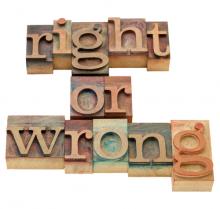
“There can be no high civility without a deep morality" ~ R.W. Emerson
“Why can’t we all just get along?” ~ Rodney King
Some of the most heated conversations I have ever participated have been with other people of faith whom I sincerely believe want the same things I want, worship the same God that I worship, and labor as hard as I do to promote human flourishing.
During this election time, we have come to expect the rhetoric to replace reason and civility is a term that has no place in our discourses. Our disagreements are often not cognitive disagreements, but differences in morality and decency. This is why they take a personal tone that is easily offended and strongly defended.
It is interesting that modern psychologists have demonstrated that our understanding of morality is actually not as easy as “right or wrong,” but rather based on five different axes or foundations. According to Psychologists Jonathan Haidt and Jesse Graham, each foundation contributes to our formation of how “right” or “wrong” an action is.
Last month, the U.S. Senate held its first hearing ever on the issue of solitary confinement in prisons. To draw attention to the issue, the National Religious Campaign Against Torture urged Americans to fast for 23 hours for one day, symbolizing the 23 hours a day prisoners spend in solitary confinement each day.
"Christian scriptures and the scriptures of all religions say much about the way we are to treat other human beings, especially the most vulnerable," said the Rev. Richard Killmer, executive director of NRCAT. "And all religious traditions teach that it is important to honor and respect the dignity and worth that God has endowed in each human being. When we put people into solitary confinement cells, which we know are going to cause harm, then we have deeply violated that requirement from God to honor and respect each human being."

Earlier this week, former President Jimmy Carter critiqued the United States for its (read: our) deteriorating record on human rights and rule of law in the last decade.
But those responding to Carter's New York Times Op-Ed (“A Cruel and Unusual Record”) have largely missed his main point. In the spirit of the Sermon on the Mount, Carter wants to lead America in removing the log from our own eye in hopes of honoring God and regaining our position as champions of human rights and rule of law.
During his visit to Cairo for the Egyptian elections, Carter met with the Grand Imam of Al Azhar — the most authoritative voice in Sunni Islam. Discussing human rights, religion, and the historic election that was taking place outside, Carter exhibited a rare humility in articulating his convictions. I feel that a whole range of human interactions might be improved if we would each remove the log from our own eye before trying to remove the speck from our neighbor’s.
Sitting with women’s rights activists and top Christian leadership; in private briefings and press conferences, this self-critique proved central to Carter’s efforts to build trust and advance human rights in Egypt and around the world.
After decades of lectures from the White House and U.S. State Department, much of the world has grown tired of the West’s wagging finger and “holier than thou” attitude. There may have been an era when this posture had a greater effect, but the U.S. has lost too much of its moral credibility in the wake of Abu Ghraib, Guantanamo, and drone strikes carried out against the President Obama's “Hit List”.
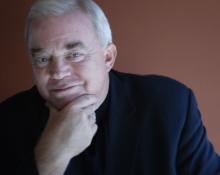
Tuesday was a big day.
Nearly 150 evangelical leaders signed onto an “Evangelical Statement of Immigration Reform.” Signers came from across the spectrum of evangelicalism including leading Hispanic evangelical organizations, to pastors such as Max Lucado, Bill Hybels, Joel Hunter, and Jim Daly, president of Focus on the Family.
No, that isn’t a typo. Sojourners stood side by side with Focus on the Family to draw attention to the plight of millions who have been caught up in our broken immigration system. It was exciting to see such unity across the traditional political spectrum that rarely happens in Washington.
Make no mistake, there are still big gaps in theology and politics among those in this group. But Tuesday wasn’t about politics. Rather we focused on the things we agreed were fundamental moral issues and biblical imperatives. This coming together to help fix a broken immigration system on behalf of those who most suffer from it is just what politics needs and could begin to affect other issues, too.
Instead of ideology, we came together because of morality and common sense. And that’s what leaders are supposed to do.
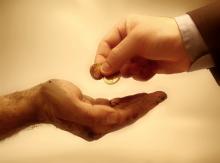
Atheists and others who don’t adhere to a religion often say they can be good without God. Now, three new studies appear to back them up.
Researchers at the University of California, Berkeley conducted three experiments that show less religious people perform acts of generosity more from feelings of compassion than do more religious people. The findings were published in the current issue of the online journal Social Psychological and Personality Science.
Their results challenge traditional thinking about what drives religious people to perform acts of kindness for others.
“The main take-away from the research is that there may be very different reasons why more and less religious people behave generously, when they do,” said Robb Willer, an assistant professor of sociology at Berkeley and a co-author of the studies.
For The Huffington Post, Max Lux argues that more needs to be done to strengthen the 'moral fiber' of the economy:
"For countries to be successful, they need to have both the right long term economic policies, focused on building and expanding the middle class, and the moral fiber to understand that power and money are not all that matters. Part of the problem with Wall Street's power in this country is that the cut throat dog-eat-dog values of Wall Street have infected way too much of our society. We need to not only take back our economic fate from Wall Street, we need to cleanse our values system of their culture as well."
Read the full article here
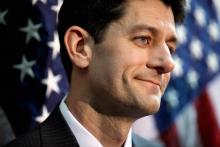
A week after House Budget Committee Chairman Paul Ryan claimed his Catholic faith inspired the Republicans' cost-cutting budget plan, the nation’s Catholic bishops reiterated their demand that the federal budget protect the poor, and said the GOP measure “fails to meet these moral criteria.”
That and other strongly-worded judgments on the GOP budget proposal flew in a flurry of letters from leading bishops to the chairmen of key congressional committee.
The letters to Capitol Hill were highlighted in a Tuesday (April 17) statement from the U.S. Conference of Catholic Bishops that came after Ryan, a Wisconsin Republican and rising conservative hero, told an interviewer last week (April 10) that his fiscal views were informed by Catholic social teaching.

VATICAN CITY — On the eve of his elevation to cardinal, New York's Archbishop Timothy Dolan said he would like to change the caricature of his city as a modern-day Gomorrah.
"New York seems to have an innate interest and respect for religion and I'm going to bring that up because I don't like that caricature that New York is some neo-Sodom and Gomorrah," Dolan told Reuters after celebrating Mass here on Friday (Feb. 17).
"I have found the New York community to be very religious and innately respectful of religion, interested in religion," he said.